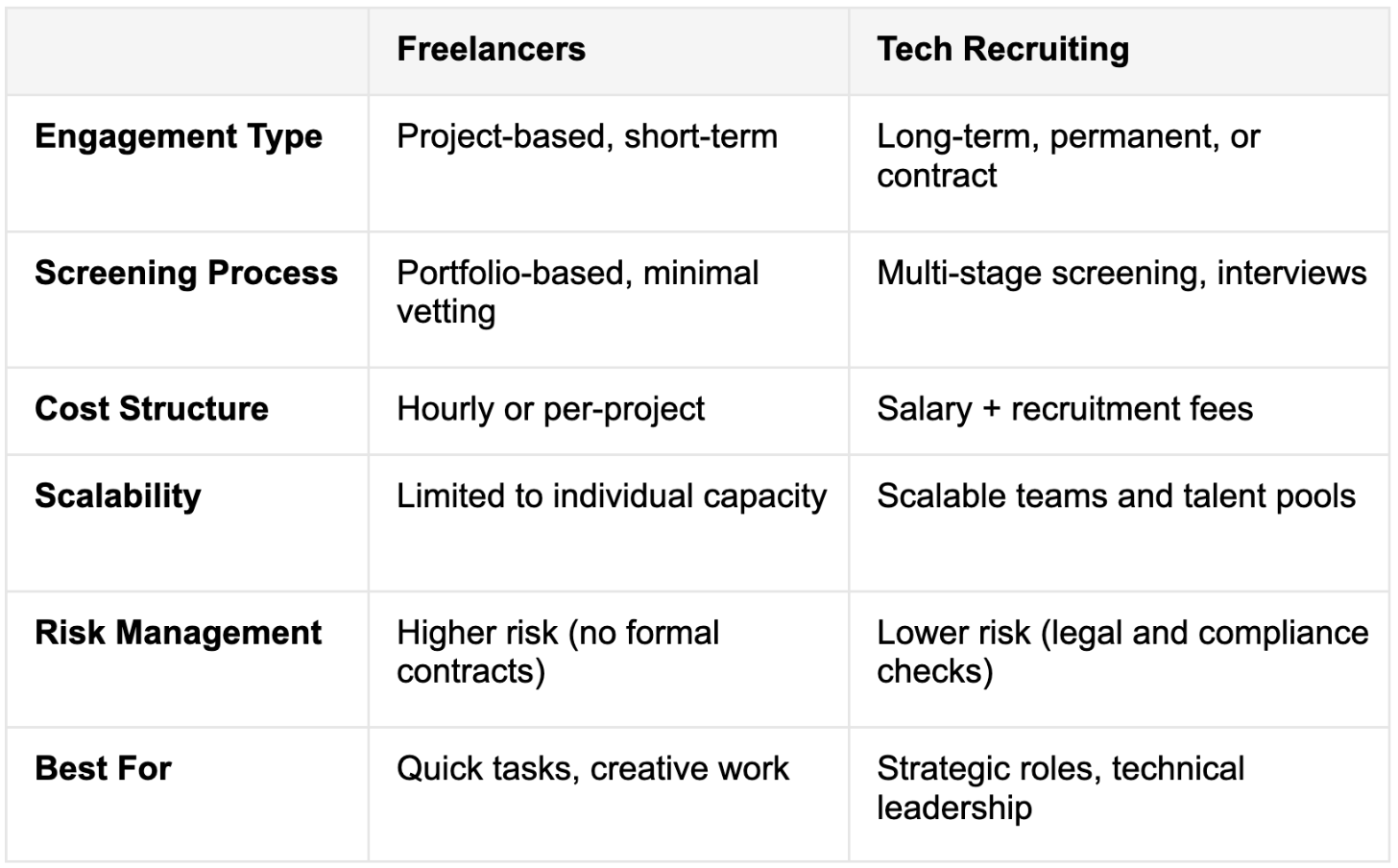What is Tech Recruiting, and When Is It Better Than Freelancers?
Updated on
Published on
In 2025, the global workforce stands at approximately 3.38 billion, with 1.57 billion people, or 46.7% engaged in freelancing. The freelance economy is booming, with platforms like Upwork and Fiverr facilitating billions in transactions. In the U.S. alone, 38% of the workforce is freelancers, contributing $1.27 trillion to the economy.
Meanwhile, the global tech recruiting market is also surging. Valued at $184.64 billion in 2024, it is projected to reach $198.8 billion in 2025, with a CAGR of 7.67% through 2033.
This growth reflects the increasing demand for specialized talent in areas like cybersecurity, AI, and software development. So, when should companies choose tech recruiting over freelancers? Let’s explore.

What Is Tech Recruiting?
Tech recruiting is the process of identifying, attracting, and hiring qualified candidates for technology-related roles such as software engineers, data scientists, IT specialists, and cybersecurity experts. For top leadership roles, organizations rely on tech executive staffing. It involves sourcing candidates through job boards, social media, and referrals, screening their technical skills, conducting interviews, and ensuring cultural fit. The goal is to fill critical tech positions that drive innovation and business growth.
What are the Key Features of Tech Recruiting?
Key features of tech recruiting focus on efficiently finding and hiring top technical talent. It emphasizes targeted sourcing, skill-based assessments, streamlined interview processes, and employer branding to attract skilled professionals who meet evolving technological and organizational needs. Some of the key features include:
- Permanent or Contract-based Hiring: Tech recruiting offers flexibility by providing both permanent and contract-based hiring options. Companies can fill long-term strategic roles or engage temporary specialists for short projects, ensuring workforce scalability and cost efficiency while meeting immediate and future technological demands.
- Screened and Vetted Candidates: Candidates undergo rigorous screening, including technical tests, background checks, and reference verification. This ensures only qualified, trustworthy professionals advance in the process, reducing hiring risks, improving quality of hires, and saving time for employers seeking top-tier tech talent.
- Specialized Recruiters with Domain Expertise: Tech recruiters often possess deep industry knowledge, understanding technical roles, required skills, and market trends. Their expertise allows them to identify suitable candidates quickly, assess technical competencies accurately, and provide valuable insights to employers during the hiring process.
- Integration with HR Systems and ATS platforms: Modern tech recruiting integrates seamlessly with HR systems and Applicant Tracking Systems (ATS), automating candidate management, tracking progress, and enhancing collaboration. This ensures a smooth hiring workflow, reduces administrative burden, and improves overall efficiency in talent acquisition.
Tech recruiting’s key features ensure organizations hire the right talent for innovation and growth. By combining precise sourcing, technical evaluations, and strong candidate experiences, it builds competitive teams ready to tackle modern technological challenges effectively.
Freelancers vs. Tech Recruiting: A Comparative Overview
Freelancers and tech recruiting represent two distinct talent acquisition approaches. Freelancers offer flexibility, quick hiring, and project-based expertise, while tech recruiting focuses on sourcing full-time or long-term talent. Comparing both helps organizations choose the most effective strategy for their unique staffing and business needs.

Freelancers provide short-term, cost-efficient solutions, whereas tech recruiting builds stable, skilled teams for sustainable growth. Understanding their differences allows businesses to balance agility with long-term capability, ensuring they secure the right talent to achieve both immediate and future technological objectives.
When Is Tech Recruiting Better Than Freelancers?
Tech recruiting is often the better choice when organizations need long-term commitment, consistent quality, and talent aligned with company culture. It suits businesses seeking to build dedicated teams for complex projects, strategic growth, or roles requiring continuous collaboration and security compliance. Some reasons why tech recruiting is better than freelancers are:
- When You Need Long-Term Commitment: For roles requiring continuity, like DevOps, backend development, or cybersecurity, tech recruiting secures full-time employees invested in your company’s goals. This ensures stability, accountability, and consistent performance, unlike freelancers who may leave mid-project or juggle multiple clients simultaneously.
- Compliance and Security Matter: Industries handling sensitive data, such as finance or healthcare, benefit from tech recruiting because recruiters perform thorough background checks, verify certifications, and ensure labor law compliance, reducing legal risks and safeguarding confidential information, as sometimes freelance arrangements rarely guarantee comprehensiveness.
- When You Need Specialized Talent: Tech recruiters tap into passive talent pools, finding highly skilled professionals who aren’t actively job-hunting but are open to compelling opportunities. This is crucial for hard-to-fill roles like AI engineers or blockchain developers, where expertise directly impacts business success.
- When You’re Scaling Fast: Rapid growth demands quick yet reliable hiring. Tech recruiting leverages networks, applicant tracking systems, and streamlined processes to fill multiple roles efficiently, helping organizations scale teams while maintaining quality. Sometimes freelancers alone cannot sustain long-term operational expansion.
Tech recruiting outshines freelancers when stability, scalability, and organizational integration are priorities. It ensures reliable, skilled professionals contribute to sustained success, making it ideal for mission-critical projects, permanent roles, and companies aiming to nurture innovation through a cohesive workforce.

The Growth of Technology Recruitment Companies
69% of organizations report difficulties in recruiting for full-time roles. The rise of tech recruiting firms reflects tighter labor markets, AI adoption, and specialized demand. LinkedIn’s 2024 Future of Recruiting shows skills-first search and generative-AI tools boosting recruiter efficiency and InMail acceptance, signaling a shift from pedigree to capabilities.
SHRM’s 2025 talent trends report still finds most employers struggling to hire for full-time roles amid changing skills needs, reinforcing the value of expert intermediaries who can curate talent and advise on branding.
On the supply side, Stack Overflow’s 2024 survey indicates a vast, global developer base with varying employment statuses, requiring targeted outreach across regions and communities.
Meanwhile, Gartner predicts AI will be embedded in most recruiting tools by 2027, enabling faster sourcing, matching, and pipeline analytics show which capabilities agencies rapidly operationalize. In markets like India, budgets are shifting toward AI-driven platforms, emphasizing quality over speed.
These forces are elevating specialized tech recruiters as strategic partners that blend domain expertise, data, and automation to consistently deliver scarce, high-impact talent. For startups and enterprises alike, this partnership increasingly determines build velocity today.
Global Trends Driving Tech Recruiting
Global trends are reshaping tech recruiting. Over 50% of enterprises now embed AI in their hiring workflows, slashing time-to-hire by nearly half. The gig economy, encompassing around 12% of the global labor force, is booming. Meanwhile, skills-based hiring is transforming traditional credential barriers.
- AI and Automation: Organizations increasingly embed AI into hiring. For example, Unilever reviewed 250,000 applications and reduced recruitment time from four months to just four weeks, saving an estimated 50,000 labor hours.
- Gig Economy Normalization: The freelance boom is undeniable: roughly 12% of the global labor force participates in the gig economy, and freelancers generated approximately $1.5 trillion in earnings in 2024.
- Skills-Based Hiring: Traditional degree filters are giving way to skills-first approaches. Only 1 in 700 hires in 2023 were made solely on skills. But this is changing: AI and green-sector postings are up 21%, while degree mentions dropped by 15%.
- Data-Driven Talent Matching ( New Trend #1 ): Modern tech recruiters rely on analytics, AI-based sourcing, and predictive dashboards to match candidates efficiently, shortening hiring cycles and increasing hiring quality.
- Remote & Global Recruitment Reach ( New Trend #2 ): As remote work normalizes, recruiters tap vast global talent pools across time zones and borders, expanding access to niche skills and diverse perspectives.
Tech recruiting thrives on AI-enhanced workflows, responds to the rise of the gig workforce, and adapts via skills-first hiring. Layering data analytics and global reach enables recruiters to find high-quality, scalable talent swiftly, making them essential in today’s dynamic hiring environment.
Conclusion: Choose Wisely Based on Your Needs
Freelancers offer flexibility and speed, but tech recruiting delivers depth, reliability, and strategic alignment. For startups scaling fast or enterprises seeking top-tier talent, tech recruiting is often the better choice.



webp.webp)
webp.webp)




